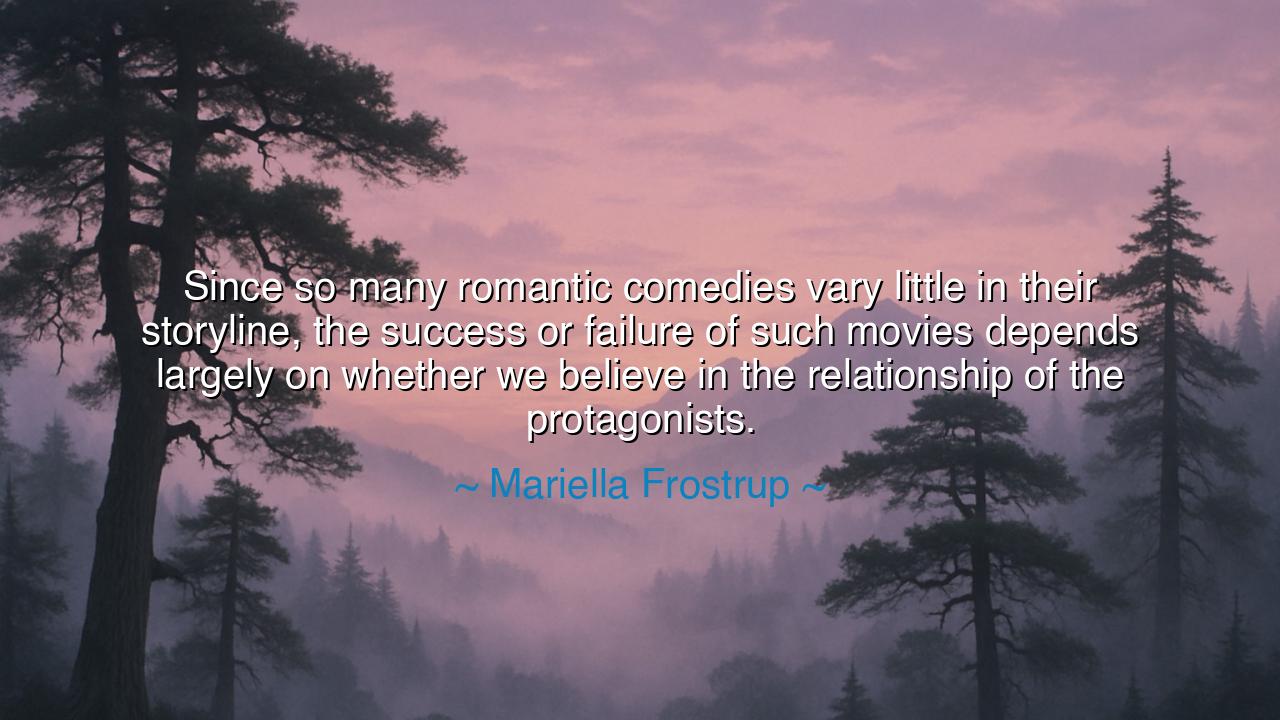
Since so many romantic comedies vary little in their storyline
Since so many romantic comedies vary little in their storyline, the success or failure of such movies depends largely on whether we believe in the relationship of the protagonists.






"Since so many romantic comedies vary little in their storyline, the success or failure of such movies depends largely on whether we believe in the relationship of the protagonists." These insightful words by Mariella Frostrup draw attention to a fundamental truth about storytelling, especially within the genre of romantic comedy. The plot, in many of these films, may follow a familiar path—two people meet, fall in love, face obstacles, and ultimately find happiness—but it is the authenticity and believability of the relationship that determines whether the audience is drawn into the world of the film or remains detached. The essence of any love story, whether in film or in life, is not in the novelty of the plot but in the depth and realness of the emotional connection between the characters.
In the ancient world, love stories were often the foundation of the most enduring and powerful narratives. Think of the tale of Pyramus and Thisbe, two lovers whose relationship, despite its tragic end, has been passed down through generations. The tragedy lies not just in the fate of the characters, but in the belief of their deep love and their longing to be together against impossible odds. Their story has endured because of the genuine emotion at its core, not because of any groundbreaking plot twist. In much the same way, Frostrup points out that in romantic comedies, it is the believability of the relationship that makes the story compelling, even if the storyline follows well-trodden ground.
The ancient Greeks understood that human relationships were at the heart of drama and tragedy, and thus the audience’s ability to connect with the characters was paramount. In Sophocles’ Antigone, we find a love for family that defies both law and fate. The deep emotional connection between Antigone and her brother, as well as the tension with her uncle Creon, creates a narrative that is driven by emotional truths, even though the plot of familial duty versus state law is one that has played out across many cultures and epochs. The relationship between Antigone and her family is believable, even as it unfolds in the tragic light of inevitable destruction. This emotional resonance is what makes the story unforgettable.
Similarly, in romantic comedies, the relationship between the protagonists is the thread that binds the audience to the film. Take, for example, the film "When Harry Met Sally." While the storyline is familiar—a man and a woman meet, become friends, and eventually fall in love—the success of the film lies in how Harry and Sally develop as characters. Their dialogue, their differences, and their shared moments of vulnerability make their love story not just possible, but deeply believable. It is the genuine chemistry between the characters, and the emotional truth in their relationship, that carries the story beyond the simplicity of the plot.
Consider the historical example of Romeo and Juliet. Their love, though brief and tragic, is widely celebrated because it feels raw and genuine. Shakespeare’s genius lies not in the originality of their love, which is typical of many romantic tales, but in the way he presents their connection as something real, despite the chaos surrounding them. The audience is drawn into their world because of the intensity of their emotions and the depth of their bond. Had their love felt contrived or inauthentic, the tragedy would have been far less impactful. The lesson here, as Frostrup suggests, is that the relationship is the heart of the story—its truth and believability are what ultimately make the narrative compelling.
The lesson that we can draw from Frostrup’s words is that in life, as in storytelling, it is not always the uniqueness of the situation that holds power, but the authenticity of the emotions involved. Whether we are engaging in relationships or consuming stories, we find ourselves most deeply moved when the connections between individuals feel genuine and true. The beauty of life lies in these connections, not in the plot twists or grand gestures, but in the simple, everyday ways that we interact and form bonds with those around us.
In your own life, take the time to cultivate authentic relationships. Understand that true love, whether romantic or platonic, is not about perfection or grand declarations, but about being genuine, about building connections that are deep, vulnerable, and real. Like the characters in romantic comedies, it is through the shared experiences, the moments of honesty, and the willingness to open oneself to another that the strongest relationships are built. In the end, whether you are living your own story or watching a film, it is the believability of the relationships that makes all the difference. Embrace the truth of your emotional connections, and let those relationships guide you through the complexities of life.






AAdministratorAdministrator
Welcome, honored guests. Please leave a comment, we will respond soon